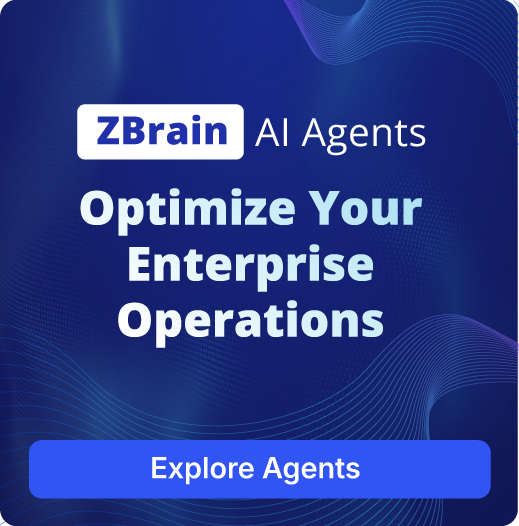Generative AI for contracts management: Use cases, development, integration, and future trends

Listen to the article
The legal industry, traditionally bound by vast amounts of manual paperwork, is undergoing a dramatic shift driven by the emergence of generative AI (GenAI). This transformative technology holds the promise of transforming every aspect of legal practice, from drafting and reviewing contracts to conducting research and providing legal advice. The potential benefits are undeniable: increased efficiency, reduced costs, and improved accuracy.
A recent Thomson Reuters Institute report sheds light on the growing enthusiasm for GenAI within the legal profession, revealing that a significant majority of legal professionals (81%) believe this technology can be applied to their work. This adoption is particularly high in law firms and corporate legal departments, reflecting the recognition of GenAI’s potential to unlock significant value and improve client service.
Contract management is one of the key areas where GenAI can make a big difference. Generative AI can automate tasks like drafting, reviewing, and analyzing contracts while also identifying key insights. This has the potential to change how contracts are managed completely.
This article explores the exciting potential of generative AI for contract management, examining how it’s being used today and what the future holds. We will delve into the various ways that GenAI can transform the contract lifecycle, from drafting and negotiation to execution and analysis, ultimately empowering firms to make more informed decisions, reduce costs, and achieve better business outcomes.
- What is generative AI?
- AI in contracts management: The current landscape
- How does generative AI for contract management work?
- The different approaches to integrating generative AI into contract management systems
- Why is ZBrain the ideal platform for contract management?
- Key use cases of generative AI for contracts management systems
- Measuring the ROI of generative AI for contract management
- Challenges and considerations in adopting generative AI for contract management
- Generative AI in contract management: Future outlook
- ZBrain: Transforming contract management with generative AI
What is generative AI?
Generative AI is a branch of AI that specializes in producing new content, like text, images, audio, video, and code. Unlike traditional AI, which analyzes data and predicts outcomes, generative AI learns patterns and relationships within existing data to generate original outputs. Its functionality extends to multiple creative tasks, including:
-
Writing emails and reports: Generate personalized and engaging content, saving you time and effort.
-
Creating images and videos: Produce realistic and creative visual content for marketing, education, or entertainment. For example, DALL-E 2, an AI system that generates images from text descriptions, enables users to turn written ideas into visual representations.
-
Composing music and code: Generate unique and innovative music pieces and code snippets. Jukebox is a prominent example of an audio-generating generative AI model. Developed by OpenAI, it generates songs in various styles and genres.
-
Translating languages: Break down language barriers by converting text between languages.
-
Summarizing documents: Extract key information from lengthy documents, making it easier to digest and understand. For example, Google’s Gemini, a large language model, can generate human-like text and efficiently process and summarize text.
How does it work?
Generative AI works by leveraging machine learning models, particularly deep learning and neural networks, to assess large datasets and recognize patterns within the data. Through a process called training, the AI learns relationships between various data points, allowing it to generate new content that resembles the data it was trained on. For example, a model trained on thousands of images can create new, realistic-looking images by understanding visual elements like shapes, colors, and textures. Similarly, language models analyze sentence structure and word usage to produce a coherent text. Rather than simply following a set of rules, generative AI continuously refines its outputs by learning from feedback and adjusting its internal parameters, making it increasingly capable of producing creative and complex results.
AI in contracts management: The current landscape
The current landscape of AI in contract management is a dynamic one, marked by growing adoption and increasing sophistication. While AI-powered tools have been used for several years to automate tasks like data extraction and clause identification, recent advancements in Natural Language Processing (NLP) and Machine Learning (ML) are driving a shift towards more comprehensive solutions. AI is now being used to analyze contracts for risk and compliance, identify potential issues and negotiate better terms. Platforms are emerging that can automatically redline contracts, generate legal documents, and provide insights into potential contract risks and areas of concern. This change is fueled by the increasing need for efficiency and accuracy in contract management, with businesses recognizing the potential of AI to reduce errors, streamline workflows, and improve overall business outcomes.
According to Gartner, 50% of organizations will use AI-enabled contract risk analysis and editing tools to support supplier contract negotiations by 2027. This demonstrates AI’s significant impact on contract management, particularly in procurement. Businesses are recognizing the advantages of AI solutions, from automating routine tasks to offering useful insights and enhancing decision-making. As AI advances, contract management is set to change even more.
How does generative AI for contract management work?
Generative AI, in the context of contract management, leverages natural language processing (NLP) to understand and interpret the complex language used in legal documents. This process can be broken down into four key steps:
- Analyze documents: The AI algorithms, trained on vast datasets of contracts, parse and understand legal documents using NLP techniques. They learn to recognize specific legal terms, clauses, and even the subtle nuances of contract language.
- Identify key terms: The AI system then identifies key terms, clauses, names, and dates within the contract. This allows it to extract vital information and pinpoint areas that require further attention.
- Automate tasks: Once key terms are identified, the AI can perform a range of automated tasks, such as:
- Flagging potential legal issues.
- Suggesting contract revisions.
- Redlining and suggesting edits for improved clarity.
- Sending reminders about key dates and deadlines.
- Generating alerts for specific stakeholders.
- Refine and improve: Through continuous learning, the AI system refines its understanding and accuracy based on new data and user feedback. This ongoing refinement ensures that AI becomes more efficient and effective over time.
Essentially, generative AI for legal contracts acts as a tireless assistant, performing the tedious tasks of analyzing, understanding, and extracting information from contracts. It then uses this knowledge to automate processes and provide insights to legal teams, freeing up valuable time for strategic work and improving overall contract management efficiency.
The different approaches to integrating generative AI into contract management systems
- Custom AI stacks – This approach involves building a custom AI solution tailored to a specific organization’s needs and existing infrastructure. Custom AI stacks are highly flexible and can be customized to meet the specific requirements of the client firm and integrate seamlessly with legacy systems. However, this approach demands significant technical expertise and resources, making it more suitable for larger companies with dedicated data science teams.
- AI point solutions – These are standalone AI tools that address specific aspects of contract management, such as data extraction, clause analysis, or redlining. Point solutions offer focused functionality and can be easily integrated into existing workflows. They are often more affordable and require less technical expertise than custom AI stacks, making them attractive to businesses with limited IT resources.
- Comprehensive platforms like ZBrain – This approach offers the most comprehensive and streamlined solution for organizations looking to harness generative AI to enhance their contract management processes. Platforms like ZBrain leverage diverse generative AI models to power solutions that automate tasks, streamline processes, and provide actionable insights across the entire contract lifecycle. ZBrain offers a holistic approach, encompassing:
- Advanced knowledge base: Securely storing and efficiently retrieving diverse contract data, including legal documents, clauses, and historical agreements.
- Low-code development: Empowering users to build business logic for applications through the intuitive ZBrain Flow interface, minimizing the need for coding expertise.
- AI agents: ZBrain AI agents operate autonomously and are designed to execute and manage specific tasks efficiently. They can be customized to guide their decision-making, and actions, allowing organizations to tailor them for tasks like contract drafting, compliance checks, and renewals. These agents can access external resources to expand their functionality. By automating contract processes, enhancing review accuracy, and streamlining approval workflows, ZBrain AI agents help organizations manage contracts more efficiently, improve response times, driving better decision-making and stronger contractual relationships.
Unlike the other approaches, fully integrated platforms like ZBrain offer a user-friendly interface, making them accessible to both legal and business teams. This eliminates the requirement for deep technical knowledge and provides a unified solution for all contract management needs.
Choosing the right approach
The optimal approach for integrating generative AI into contract management depends on individual needs, resources, and goals. Businesses with specific needs and a strong technical foundation may benefit from a custom AI stack. Those seeking focused solutions for specific tasks can leverage AI point solutions. Fully integrated platforms like ZBrain offer a comprehensive and user-friendly solution for organizations seeking to leverage generative AI across the entire contract lifecycle.
Why is ZBrain the ideal platform for contract management?
ZBrain is the ideal platform for organizations looking to enhance their contract management processes, offering a comprehensive suite of features designed to optimize workflows and improve efficiency across the contract lifecycle. Its advanced knowledge base allows for the secure storage and efficient retrieval of diverse contract data, including legal documents, clauses, and historical agreements. This robust foundation enables ZBrain to analyze contracts with exceptional accuracy, identifying key clauses, potential risks, and compliance issues. ZBrain’s Flow feature empowers users to build business logic for custom applications that could automate contract drafting, redlining, compliance checks, and renewals. ZBrain enables the selection and use of diverse Large Language Models (LLMs) to draft contracts in various languages, summarize complex legal documents, and identify key risks and compliance issues. Furthermore, ZBrain’s AI agents act as virtual assistants, automating repetitive tasks like data extraction and contract review, freeing up legal teams for more strategic work. By combining powerful AI capabilities with a user-friendly interface, ZBrain streamlines the entire contract management lifecycle, significantly reducing errors, improving efficiency, and ultimately enhancing business outcomes.
Streamline your operational workflows with ZBrain AI agents designed to address enterprise challenges.
Key use cases of generative AI for contracts management systems
|
Generative AI use cases |
Description |
How ZBrain helps |
|
Contract drafting |
Generative AI can assist in drafting contracts by generating boilerplate clauses, suggesting language based on past agreements, and adapting templates to specific situations. |
ZBrain’s NLP capabilities can help generate personalized contract language, identify potential legal risks, and optimize contract terms for better outcomes. Using ZBrain solutions, legal teams can easily create custom contracts, reducing manual effort and ensuring agreement consistency. |
|
Contract review automation |
Analysis of contracts for potential risks, compliance issues, and inconsistencies. |
ZBrain can automatically review contracts, highlight potential risks and compliance issues, and provide actionable insights for legal teams. Its advanced knowledge base, combined with its AI capabilities, enables faster and more accurate contract analysis. |
|
Risk assessment |
Identification of potential contract risks, providing legal teams with actionable insights. This empowers them to make informed decisions and mitigate potential legal challenges. |
ZBrain’s risk assessment agent automates contract risk identification by analyzing contracts for ambiguous terms, missing clauses, and unfavorable conditions. It ensures that the contracts are comprehensive and compliant with relevant regulatory standards. |
|
Contract redlining and modification |
Automation of the redlining process by suggesting changes, identifying inconsistencies, and generating revised clauses. |
ZBrain can streamline the contract redlining process by suggesting amendments based on pre-defined parameters, ensuring consistent language and avoiding potential errors. |
|
Contract summarization |
Creating concise summaries of contracts, enhancing efficiency in legal workflows by providing quick, accurate insights. |
ZBrain’s contract summarization agent generates clear, concise summaries of lengthy contracts, highlighting essential details such as obligations, deadlines, and penalties, enabling faster comprehension and more efficient contract management. This ensures that key information is easily accessible to legal teams, project managers, and decision-makers |
|
Non-disclosure Agreements (NDA) Analysis |
Quickly assessing key clauses in NDAs, identifying potential risks, and ensuring compliance with legal standards, enhancing efficiency and enabling legal teams to focus on more strategic work. |
ZBrain’s NDA analyzer agent enhances the compliance assurance process by automatically categorizing NDA into key compliance groups. It swiftly and comprehensively reviews NDAs, highlighting potential risks and ensuring compliance. |
|
Clause extraction and review |
Automatic extraction of key clauses from contracts, such as termination clauses, confidentiality provisions, or liability limitations, making identifying and analyzing specific contract terms easier. |
ZBrain contract clause extraction agent accurately identifies and extracts relevant clauses from contracts. This improves efficiency and provides legal professionals quick access to key information, significantly reducing the time and effort needed for manual clause extraction while ensuring that crucial details are easily accessible. |
|
Multilingual contract generation and review |
Generating and reviewing contracts in multiple languages, eliminating language barriers and facilitating global business operations. |
ZBrain supports multiple languages, enabling the creation and review of contracts in different languages while ensuring consistency and accuracy in translation. |
Measuring the ROI of generative AI for contract management
Generative AI holds immense potential to transform contract management, but demonstrating its value requires concrete evidence of its impact. Evaluating the return on investment of generative AI is crucial for showcasing its effectiveness and justifying its adoption.
How to calculate ROI for generative AI in contract management?
Calculating ROI for generative AI in contract management involves identifying the key cost savings and revenue increases it generates. Begin by quantifying the time and resources spent on manual contract processes, including drafting, review, analysis, and negotiation. Next, estimate the time and cost savings achieved by automating these tasks using generative AI. For example, consider the reduction in labor hours, the elimination of manual errors, and the faster turnaround times enabled by AI-powered contract automation tools. Additionally, measure the revenue increase or cost reduction resulting from improved contract terms, reduced risk, and enhanced contract compliance with AI analysis and insights. By comparing these cost savings and revenue gains to the initial investment in generative AI technology, you can calculate a clear ROI for your organization.
Examples of ROI from ZBrain implementations in contract management workflows
- Reduced operational costs
- Use case: Automating contract review and analysis tasks.
- ROI metrics: Reduced labor costs, decreased time spent on manual reviews, and fewer errors.
- Example: ZBrain can automate the review of hundreds of contracts, reducing the time and resources required by legal teams. This translates into significant cost savings, as legal teams can focus on higher-value tasks.
- Improved customer satisfaction
- Use case: Accelerating contract processing times and improving contract clarity.
- ROI metrics: Reduced time to close deals, improved customer experience and increased customer retention.
- Example: ZBrain can generate contract drafts quickly and efficiently, allowing businesses to close deals faster and provide a smoother customer experience. This can lead to improved customer satisfaction and higher customer retention.
- Faster decision-making processes
- Use case: Generating insightful reports to support contract analysis and risk assessment.
- ROI metrics: Reduced decision-making time, improved contract negotiation outcomes and enhanced risk mitigation.
- Example: ZBrain equips legal teams with up-to-date insights and analytics, helping them make informed decisions on contract negotiations, risk management, and compliance. This results in improved outcomes and higher profitability.
Beyond the numbers
While quantifying ROI through hard numbers is important, it’s also crucial to consider the qualitative benefits of generative AI. These benefits include:
-
Increased efficiency: Freeing up legal teams for more strategic work.
-
Enhanced accuracy: Reducing errors and improving the quality of contract management.
-
Improved compliance: Minimizing legal risks and ensuring compliance with relevant regulations.
-
Enhanced competitive advantage: Gaining an edge by leveraging the power of AI.
By combining the tangible benefits of cost savings and increased revenue with the intangible benefits of improved efficiency and enhanced decision-making, generative AI can play a key role in the success of your business.
Challenges and considerations in adopting generative AI for contract management
While generative AI holds immense potential for transforming contract management, its adoption comes with certain challenges and considerations:
- Data quality and security: Generative AI models are trained on vast datasets, and the quality of this data significantly impacts model performance. Incomplete or inaccurate data can result in biased or incorrect results.
- Bias and fairness: AI models can adopt biases present in their training data, which may result in unfair or discriminatory outcomes.
- Explainability and transparency: Generative AI models are often seen as “black boxes,” making it challenging to understand how they produce their results. This absence of transparency can impede trust and hinder adoption.
- Human oversight and validation: Generative AI should not replace human judgment but rather act as a tool to augment and enhance human capabilities.
- Integration and scalability: Integrating generative AI into existing contract management systems can be complex and require technical expertise. Scaling AI solutions to accommodate large contract volumes can also present challenges.
- Legal and ethical considerations: Legal and ethical implications of using AI in contract management are still evolving. There are concerns regarding data privacy, intellectual property rights, and potential liability issues.
By carefully considering these challenges and implementing appropriate solutions, organizations can harness the transformative power of generative AI for efficient, accurate, and reliable contract management.
Streamline your operational workflows with ZBrain AI agents designed to address enterprise challenges.
Generative AI in contract management: Future outlook
The rapid evolution of generative AI promises to transform contract management further, pushing the boundaries of what’s possible and reshaping how businesses approach legal agreements. Here’s a glimpse into the exciting future:
- Enhanced language understanding and generation – Generative AI models are rapidly becoming more adept at understanding and generating complex legal language, surpassing even human comprehension in some cases. Expect contracts to be drafted with unparalleled accuracy and precision, reflecting the nuances of legal terminology and incorporating specific clauses with pinpoint accuracy.
- Hyper-personalized contracts – The future holds the potential for hyper-personalized contracts tailored to individual needs and circumstances. This means no more generic agreements. Generative AI will dynamically adapt contract terms to specific situations, leveraging vast datasets and past interactions to create customized agreements.
- AI-driven contract negotiation – Imagine AI-powered negotiation assistants that analyze contracts in real-time, identifying leverage points and suggesting optimal counter-offers. This technology will transform negotiation from a subjective art to a more data-driven science, ensuring businesses secure the best possible terms.
- Predictive contract performance and risk assessment – Using generative AI for contract risk assessment enables the analysis of massive datasets to predict potential outcomes, such as the likelihood of disputes, renewal rates, and overall contract performance. This proactive approach will allow businesses to mitigate risks and optimize their contract portfolio proactively.
- AI-powered Contract Lifecycle Management (CLM) – The complete contract lifecycle, starting from drafting and reviewing to execution, renewal, and termination, will be streamlined by AI-powered CLM platforms. This means faster turnaround times, reduced errors, and greater efficiency across all stages.
- Smart contract generation with AI – Integrating generative AI with smart contracts will enhance automation and efficiency. Smart contracts, self-executing agreements written in code, will become more sophisticated, capable of handling complex logic and adapting to real-time conditions. This will transform the execution of contracts, minimizing the reliance on intermediaries and simplifying complex transactions.
- Integration with other business systems – Generative AI will seamlessly integrate with other business systems, such as CRMs, ERP, and accounting software. This will create a holistic view of contract data, enabling businesses to make informed decisions and optimize operations across departments.
- The rise of LegalTech solutions – Generative AI will continue to fuel the growth of innovative legal technology solutions, making legal services more accessible, efficient, and affordable. Expect AI-powered tools to assist with tasks like legal research, due diligence, and contract automation.
The future of generative AI for contract management promises to be transformative, offering businesses the opportunity to unlock significant efficiency gains, reduce risks, and improve overall business performance. As AI technology advances, we can anticipate the emergence of more powerful and sophisticated tools that will further change how contracts are managed and negotiated.
ZBrain: Transforming contract management with generative AI
ZBrain, powered by generative AI, enables organizations to optimize contract management by automating workflows, improving compliance, and enhancing decision-making. Its AI-driven capabilities streamline contract analysis, reduce manual effort, and ensure accuracy across the contract lifecycle.
-
AI readiness assessment: ZBrain’s AI readiness framework, ZBrain XPLR, evaluates an organization’s preparedness for AI adoption in contract management. It provides actionable insights to identify strengths and areas for improvement, ensuring a smooth AI-driven transformation.
-
Low-code development for contract automation: ZBrain Builder, a low-code platform, simplifies the development of custom AI applications for contract management, making automation accessible to legal teams without requiring extensive technical expertise.
-
Intelligent contract analysis: ZBrain leverages AI to extract key clauses, identify risks, and assess contract compliance issues, ensuring organizations can make data-driven decisions efficiently.
-
Proprietary data utilization: The platform enables organizations to harness their proprietary legal data, ensuring AI-driven contract solutions align with specific business policies and regulatory requirements.
-
Enterprise-grade security and scalability: Designed for large-scale deployments, ZBrain integrates with existing contract management systems while ensuring compliance with enterprise security standards.
-
End-to-end contract lifecycle support: ZBrain automates the entire contract lifecycle, from drafting and redlining to compliance checks and renewals, reducing processing time and human errors.
-
AI-powered contract agents: ZBrain’s AI agents assist legal teams by automating routine tasks such as contract summarization, clause extraction, and risk assessment, freeing up resources for strategic decision-making.
These capabilities position ZBrain as a next-generation AI platform that enhances contract accuracy, improves operational efficiency, and ensures seamless contract lifecycle management.
Endnote
As generative AI continues to reshape the legal landscape, businesses are presented with an unparalleled opportunity to optimize their contract management processes. ZBrain, a cutting-edge enterprise generative AI platform, is at the forefront of this evolution, allowing organizations to leverage the power of AI for transformative results. ZBrain’s robust set of features, including its advanced knowledge base, intuitive low-code interface, and intelligent AI agents, empowers businesses to automate contract drafting, review, negotiation, and management with unprecedented efficiency and accuracy. ZBrain goes beyond simply automating tasks; it provides actionable insights and data-driven decision support, allowing legal teams to concentrate on strategic initiatives and enhance business outcomes.
With ZBrain, businesses can unlock the full potential of generative AI for contract management, reducing operational costs, improving customer satisfaction, accelerating decision-making, and ultimately achieving a competitive advantage in today’s fast-changing business landscape.
Ready to transform contract management with the power of generative AI? Discover how ZBrain can help you streamline your processes, reduce risks, and drive better business outcomes.
Listen to the article
Author’s Bio

An early adopter of emerging technologies, Akash leads innovation in AI, driving transformative solutions that enhance business operations. With his entrepreneurial spirit, technical acumen and passion for AI, Akash continues to explore new horizons, empowering businesses with solutions that enable seamless automation, intelligent decision-making, and next-generation digital experiences.
Table of content
- What is generative AI?
- AI in contracts management: The current landscape
- How does generative AI for contract management work?
- The different approaches to integrating generative AI into contract management systems
- Why is ZBrain the ideal platform for contract management?
- Key use cases of generative AI for contracts management systems
- Measuring the ROI of generative AI for contract management
- Challenges and considerations in adopting generative AI for contract management
- Generative AI in contract management: Future outlook
- ZBrain: Transforming contract management with generative AI
Frequently Asked Questions
What is ZBrain, and how can it optimize contract management processes with AI?
ZBrain is an end-to-end AI enablement platform that assists businesses in streamlining AI adoption across various functions, including contract management. From assessing AI readiness to solution development and deployment, ZBrain offers comprehensive support to optimize contract drafting, compliance checks, renewals, and risk management processes.
Here’s how ZBrain enhances contract management:
-
AI readiness assessment with ZBrain XPLR: ZBrain XPLR provides a comprehensive AI readiness assessment, enabling organizations to evaluate current contract management processes and identify strategic opportunities for AI integration, thereby enhancing operational efficiency and informing data-driven decisions.
-
Seamless data ingestion and integration: ZBrain Builder integrates with existing contract management systems, legal databases, and other relevant platforms to ensure smooth data flow. This integration enables businesses to maintain accurate, real-time contract records by combining structured and unstructured data for better compliance and risk assessment decisions.
-
Low-code development environment: ZBrain Builder’s intuitive, low-code interface empowers teams to quickly build and deploy AI-driven solutions with minimal coding expertise. This accelerates the automation of contract processes, from drafting and reviewing to compliance monitoring and renewal management.
-
Cloud and model flexibility: ZBrain supports various AI models, including GPT-4 and LLaMA, and integrates seamlessly with cloud platforms like AWS, Azure, and GCP, providing the flexibility to select the optimal infrastructure for cost-effective, scalable contract management solutions.
-
Enhanced compliance and governance: ZBrain’s gen AI capabilities help ensure continuous monitoring and compliance with industry regulations, legal standards, and internal policies related to contract management. By flagging potential risks in contract terms and conditions, ZBrain strengthens operational governance and audit readiness.
By offering a low-code platform with powerful data integration and customizable AI capabilities, ZBrain enables organizations to automate, optimize, and innovate their contract management processes, enhancing compliance, reducing risks, and improving overall efficiency.
How does ZBrain ensure the security and privacy of sensitive data in contract management processes?
ZBrain is built with a strong focus on data privacy and security, ensuring that sensitive contract management information is protected at all stages. Here’s how ZBrain safeguards sensitive data in the contract management lifecycle:
Private cloud deployments: ZBrain agents can be deployed in a private cloud environment, ensuring that critical contract data, such as legal documents, clauses, and historical agreements, is securely stored within the organization’s infrastructure.
Robust security features: ZBrain incorporates multiple layers of security to protect sensitive data, including:
-
Access controls: Granular role-based access controls ensure only authorized personnel can view or manage sensitive contract-related data, such as contract terms, client information, and compliance details.
Compliance and governance: ZBrain is designed to meet industry-specific regulations and standards ISO 27001:2022 and SOC 2 Type II, ensuring that contract management data is handled in compliance with confidentiality, integrity, and accountability requirements.
This comprehensive security approach ensures that sensitive contract management data remains protected throughout its lifecycle—from contract creation and negotiation to execution and storage.
Can ZBrain AI agents be integrated with existing contract management systems?
Yes, ZBrain AI agents are designed to integrate seamlessly with existing contract management systems. The platform supports various data formats and standards, ensuring smooth interoperability with legacy enterprise resource planning (ERP), customer relationship management (CRM), and document management systems.
This integration allows organizations to:
-
Leverage existing infrastructure: Enhance current contract management processes without the need for a complete overhaul of legacy systems.
-
Enrich data and workflows: Connect ZBrain AI agents with existing tools to automate contract drafting, reviews, approvals, and compliance checks, improving data accessibility and efficiency.
-
Drive AI-driven insights: Utilize AI capabilities to analyze contract terms, monitor compliance, and enhance decision-making while maintaining compatibility with existing technologies.
By enabling seamless integration, ZBrain ensures that organizations can modernize their contract management processes without disrupting existing systems, improving overall operational efficiency.
What kind of contract management agents can be built on ZBrain Builder?
ZBrain Builder enables the development of AI agents tailored to various contract management use cases. These agents support tasks such as contract drafting, review, compliance checks, and obligation tracking. ZBrain’s advanced AI capabilities help organizations streamline contract analysis, reduce manual effort, and enhance visibility into contract terms. By automating these processes, businesses can deliver a more efficient and responsive contract management system, improving overall operational efficiency.
How does ZBrain cater to diverse contract management needs across business operations?
ZBrain’s flexibility allows it to address various contract management requirements. You can create tailored AI agents to automate contract drafting, streamline reviews, monitor compliance, and track obligations. Its efficient AI agents enable businesses to enhance accuracy, reduce manual effort, and improve decision-making across various contract management processes in any industry.
How can we measure the ROI of ZBrain in our contract management processes?
Measuring ROI from ZBrain in contract management involves evaluating key performance indicators (KPIs) tied to automation, compliance, and efficiency. Here are some important metrics to consider:
-
Reduced manual effort: Automating tasks like contract drafting, review, and obligation tracking leads to faster processing and improved accuracy.
-
Improved compliance: Automated compliance checks ensure adherence to regulatory standards and internal policies, reducing legal risks.
-
Enhanced contract value management: Monitoring metrics such as Annual Contract Value (ACV) and Total Contract Value (TCV) provides insights into the financial impact of contracts.
-
Operational efficiency: Streamlined workflows and real-time data updates help lower operational costs and improve overall contract management performance.
By monitoring these KPIs, businesses can quantify how ZBrain drives efficiency, reduces errors, and optimizes contract management processes.
How can I get started with ZBrain for my contract management processes?
To begin using ZBrain to optimize your contract management processes, please contact us at hello@zbrain.ai or fill out the inquiry form on our website. Our team will contact you to explore how our platform can integrate with your existing contract management systems and streamline contract management workflows.
Insights
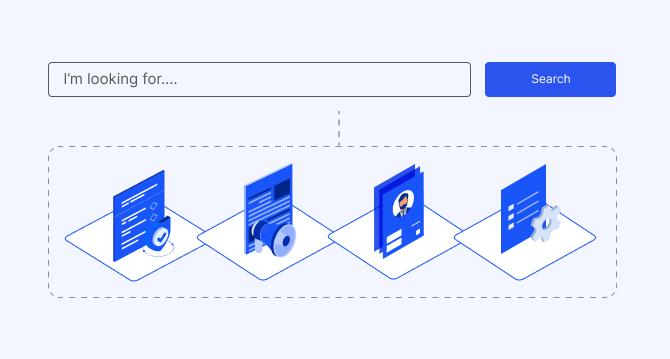
A guide to intranet search engine
Effective intranet search is a cornerstone of the modern digital workplace, enabling employees to find trusted information quickly and work with greater confidence.
Enterprise knowledge management guide
Enterprise knowledge management enables organizations to capture, organize, and activate knowledge across systems, teams, and workflows—ensuring the right information reaches the right people at the right time.
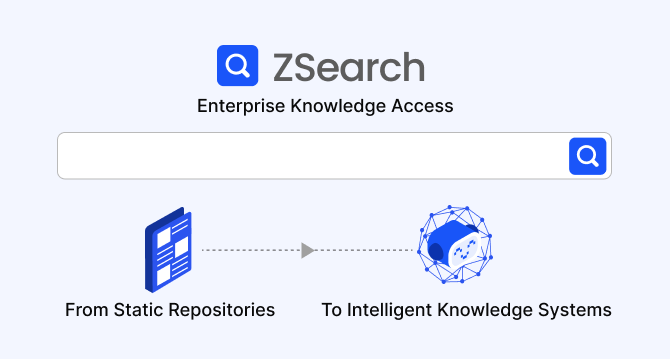
Company knowledge base: Why it matters and how it is evolving
A centralized company knowledge base is no longer a “nice-to-have” – it’s essential infrastructure. A knowledge base serves as a single source of truth: a unified repository where documentation, FAQs, manuals, project notes, institutional knowledge, and expert insights can reside and be easily accessed.
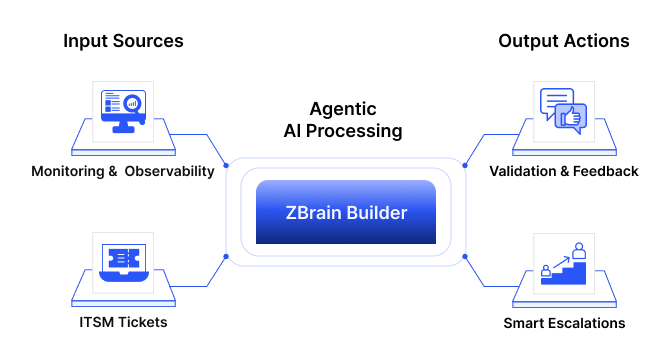
How agentic AI and intelligent ITSM are redefining IT operations management
Agentic AI marks the next major evolution in enterprise automation, moving beyond systems that merely respond to commands toward AI that can perceive, reason, act and improve autonomously.
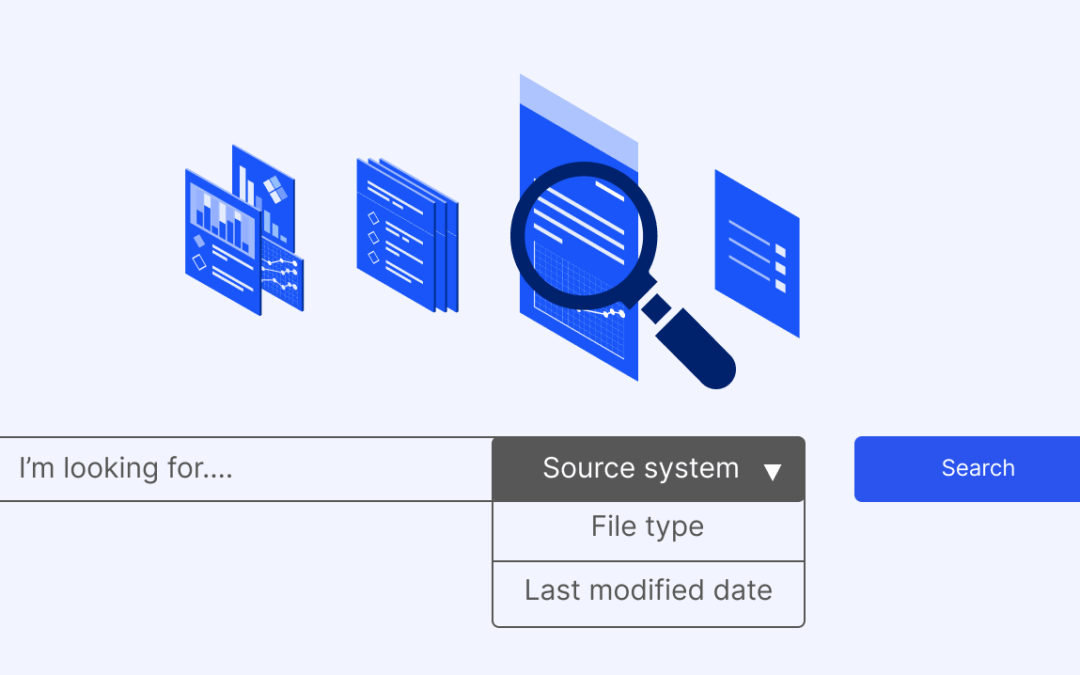
What is an enterprise search engine? A guide to AI-powered information access
An enterprise search engine is a specialized software that enables users to securely search and retrieve information from across an organization’s internal data sources and systems.
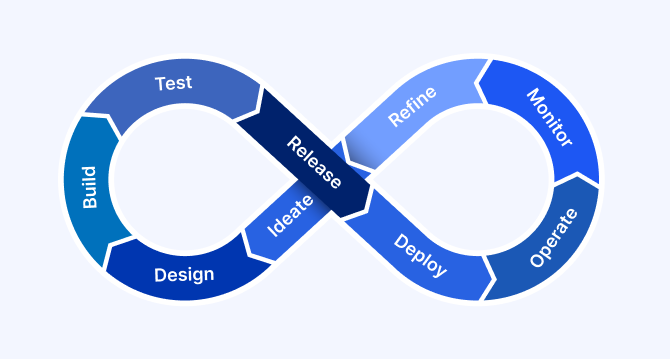
A comprehensive guide to AgentOps: Scope, core practices, key challenges, trends, and ZBrain implementation
AgentOps (agent operations) is the emerging discipline that defines how organizations build, observe and manage the lifecycle of autonomous AI agents.
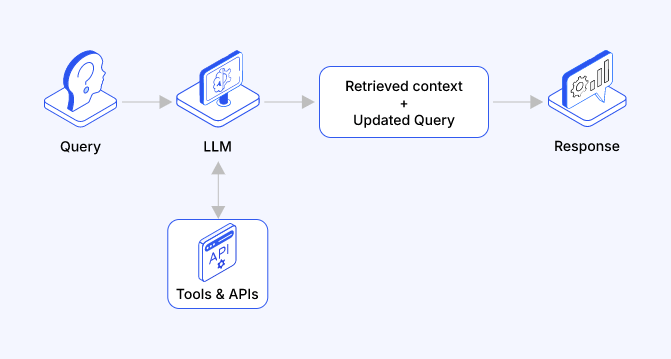
Adaptive RAG in ZBrain: Architecting intelligent, context-aware retrieval for agentic AI
Adaptive Retrieval-Augmented Generation refers to a class of techniques and systems that dynamically decide whether or not to retrieve external information for a given query.
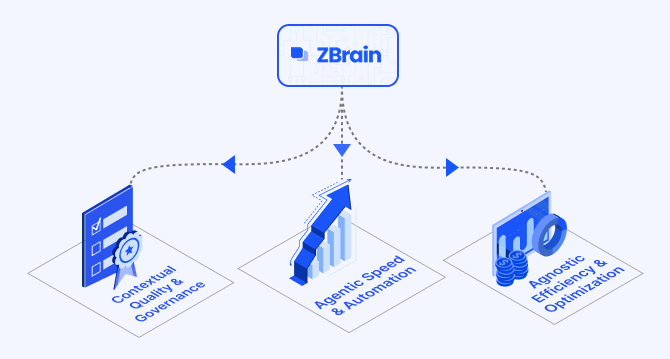
How ZBrain breaks the trade-offs in the AI iron triangle
ZBrain’s architecture directly challenges the conventional AI trade-off model—the notion that enhancing one aspect inevitably compromises another.
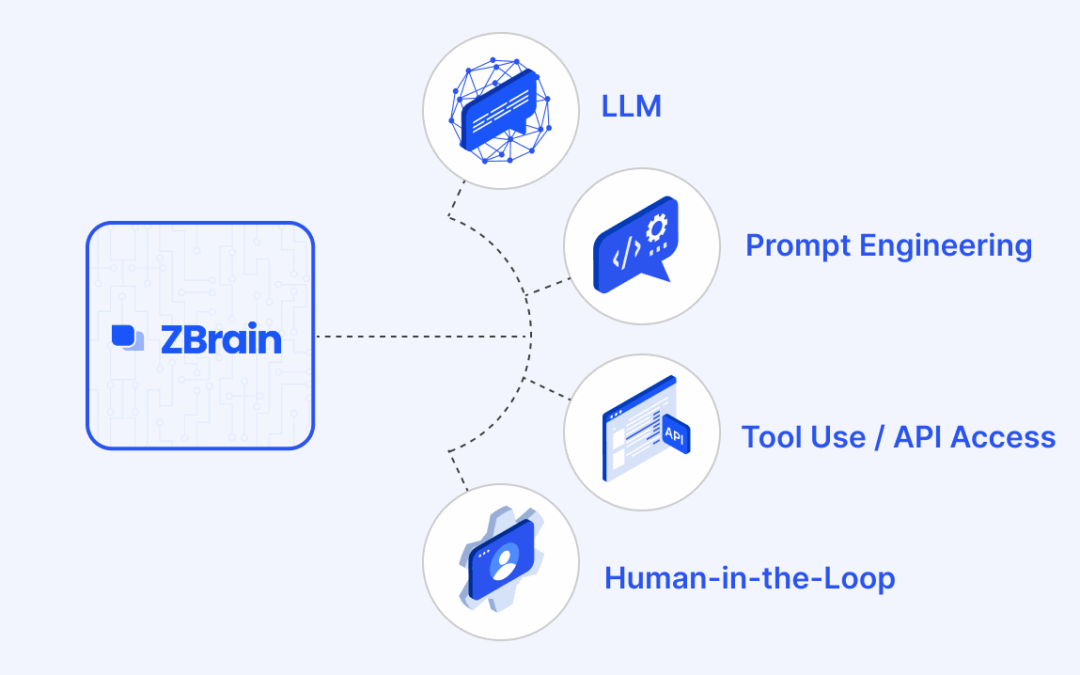
ZBrain Builder’s AI adaptive stack: Built to evolve intelligent systems with accuracy and scale
ZBrain Builder’s AI adaptive stack provides the foundation for a modular, intelligent infrastructure that empowers enterprises to evolve, integrate, and scale AI with confidence.




